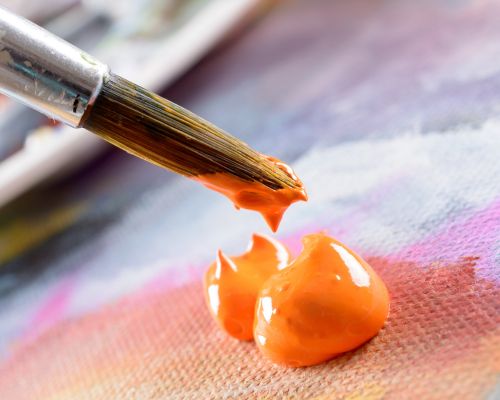Oil Paint Vs. Acrylic Paint: How To Choose The Best Paint For You
Are you ready to join the discussion about oil paint vs. acrylic paint?
Both paint mediums have devoted fanbases. And that’s not surprising:
Many artists prefer to work with acrylics. After all, acrylic paint dries faster and is easier to implement in a painting. However, the oil paint has many advantages too:
By all means, using oil paint when creating an artwork provides the opportunity to achieve texture and depth. So, which medium is better?
There can be a strong argument in favor of both sides of the paint medium equation. How about we dwell deeper in that argument?
Recommended Read:
- How To Use Acrylic Paint
- Easy Acrylic Painting Techniques For Beginners
- 30 Acrylic Painting Tips
- Oil Painting Techniques For Artists
- Oil Painting For Beginners
Get To Know Your Paints
First things first, you can’t begin working with a new paint medium before you understand what makes that paint unique. In other words, what helps oil or acrylic paint stand out from the other paints? Furthermore, why should you work with one of these mediums instead of the other?
As you can probably guess, you can’t answer these questions until you learn the difference between oils and acrylics. So, let the subject of oil paint vs. acrylic pain begin:
What Is Oil Paint?

An oil painting is easy to spot, even if you’re a newbie artist or no artist at all:
Oil paints have different consistencies and textures than all other paints. An oil base and color pigments work together to create what we know as oil painting.
Here is some essential info you must know if you plan to create oil artwork at some point in time:
Generally, oil paints are quite thick. Subsequently, they provide consistency that looks oil and creamy simultaneously.
That’s one of the reasons oil paint is the perfect medium to use on different surfaces, such as canvas, wood, and metal.
On the downside, oil paint takes longer to dry. Some artists don’t mind the longer creative process. But if you want to finish a painting fast, using oil paints might not be the best idea.
Another disadvantage of using oil paints is the number of chemicals they contain. Unfortunately, most oil paint mediums are toxic and solvents, so you must protect yourself while working with them. Wearing a mask or gloves will do the trick.
What Can You Use Oil Paint For?
Artists use oil paint on canvas, wood, metal, ceramics, and other thicker boards.
Due to its oily base, the oil paint medium works better when using a primer as a base.
What Is Acrylic Paint?

Shall we move on to the second part of the oil paint vs. acrylic paint equation? I think we’re ready to discuss acrylic paint:
Firstly, the acrylic paint medium is similar to the oil one, minus the oil base. Actually, acrylic paint is water-based. Without containing the same number of chemicals as oils, acrylic paints are much safer to use by artists.
What does this mean? Think of it that way:
Above all, acrylic paint will allow you to create bright color combinations while the drying time is way shorter than when using oil paints.
However, you can’t expect to achieve deep texture, layers, and interesting shadows with acrylic paint – oil is the better choice for that kind of artwork.
Meanwhile, working with acrylics will let you easily mix colors and implement different blending techniques. In difference with oils, acrylics come off easily – a bit of soapy water is enough to remove acrylic paint.
What Can You Use Acrylic Paint For?
Quite frankly, you can use acrylic paint when working on a variety of projects.
Considering their fast drying time, acrylic paint is suitable for canvas, paper, wood, glass, and ceramics.
Oil Paint Vs. Acrylic Paint

Let me make something clear from the get-go:
Beginner artists will have an easier time if they decide to work predominantly with acrylic paint. Creating artwork with acrylic paint results in faster dry time and less work overall.
With that said, I don’t mean you should never paint with oils. On the contrary, oil paint has enormous possibilities for artists. But you should start with oil after you gain some painting experience.
Are we ready to look at the differences between oil and acrylic paints? I think we are:
Color Quality
Do I how to explain how essential color quality is when you create paintings to sell? Making sure your art products are created with materials of the highest quality is not the only reason to pay attention now:
Above all, color quality is one of the top factors to consider when choosing the right paint medium for you and the artwork you produce.
Before you pick a painting medium, think about the level of your artistic abilities and everything you want your brand to represent to the audience. Once you do that, you’ll be able to decide which paint suits you better – oil or acrylic.
Regardless of your budget, you can purchase high-quality oil and acrylic paint at affordable prices.
Paint Cost
Speaking of prices, I have to dwell a bit more on the topic since we discuss oil paint vs. acrylic paint:
No matter how you want to look at it, oil paint will cost you more than acrylic. And that’s a fact due to a simple reason:
When working with oils, you’ll have to invest in specific painting tools and solvents. Sure, they won’t cost you a fortune but will increase your art supply expenditures compared to acrylics.
Also, oil brushes tend to cost more – you should keep that in mind. Another factor to consider is the painting surface:
Generally, using an oil paint medium requires a primed canvas or spending extra for a primer you can apply yourself.
Long story short, working mostly with oils instead of acrylics will cost you more money.
Final Touches On Your Painting

Alright, I want to direct your attention to the final part of your painting process – the finishing part.
Let’s see – you need to know what the finishing part of your painting will look like if you create it with both oil and acrylics. Instead of wasting time to paint the same artwork with both mediums, I can tell you right now what to expect:
Oil paints will deliver a higher gloss. Meanwhile, acrylics will provide a flatter finish.
There you have it!
Lightfastness
The next factor to think about while mentally reviewing oil paint vs. acrylic paint is durability (lightfastness).
At this stage, you already know that acrylics and oils contain the same color pigments. As a result, both paint mediums share the same lightfastness abilities.
For those who don’t know, lightfastness is a term that explains how sunlight will affect your artwork. Here is what you should know about that:
Paintings created with oils have a better chance of staying unaffected by weather conditions in the long run. Acrylic paintings may succumb to moisture in the air and that will affect their surface and quality.
Mixing/Blending Colors
Blending colors is a common painting technique artists use in both oil and acrylic paintings. Can you guess which paint medium is easier to mix?
If you guess oils, you’ll be correct:
Oil paint takes longer to dry and that’s why the medium is easier to work with, especially with blending.
Naturally, using acrylics to mix colors is harder since the paint dries quite fast. But if you can do the mixing fast enough, there is no reason not to work with acrylics.
Drying Time
What can I say about drying time you don’t already know?
Acrylics dry faster than oil. Subsequently, working with oil on large paintings that will take a long time to complete anyway is not a great idea.
Oil Paint Vs. Acrylic Paint FAQs
Is Acrylic Or Oil Painting Easier?
Creating an oil painting is easier than completing an acrylic artwork:
Considering oil paint takes longer to dry, the artists using it will be able to take their time while working on shading or blending.
Do Professional Artists Use Oil Or Acrylic Paint?
Professional artists use both oil and acrylic painting mediums if they create artwork on canvas.
However, using acrylics is better if you plan to paint on different surfaces than canvas, such as wood, glass, or metal.
Why Choose Oil Paint Over Acrylic?
Oil paint is more resistant to moisture, so any artwork you create with oil will stay in perfect shape and keep its quality for a longer time.
Final Say
Talking about oil paint vs. acrylic paint is a subject that can go on for hours.
But here is the thing:
Both oil and acrylic paints have their advantages and disadvantages. I’ll say try them both and decide which one suits your skills and vision better.
After all, there is no need to choose – you can create amazing artwork regardless of the paint type you use.
What questions do you have on this topic?
Let me know in the comments section below.
Thanks for this really helpful post. I am a beginner artist. And thanks to you I know exactly what type of paint to aim for in the future. Thanks!
You are so welcome, Christina!